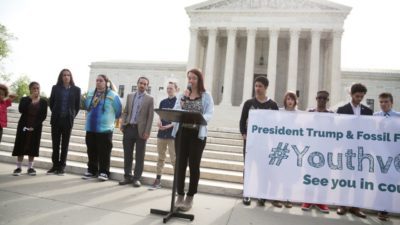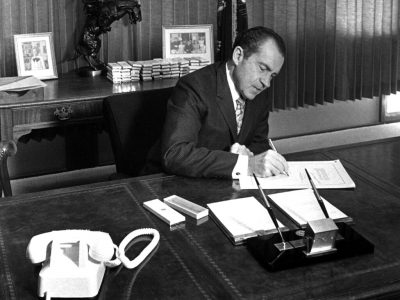Litigation
Deciding a Climate Case in the Shadow of the Supreme Court
Juliana Judges Surely Had The Higher Court in Mind in Drafting Their Decision
The irony of the Ninth Circuit decision dismissing the Juliana v. United States case this week is plain to see. Two branches of government — the legislative and executive – have failed to act to address an environmental problem that may cause the destruction of the federal government itself. The third branch, the judiciary, recognizes the …
Continue reading “Deciding a Climate Case in the Shadow of the Supreme Court”
CONTINUE READINGJuliana and the Future of Climate Litigation
Asking judges to pass judgment on all U.S. energy policy was a bridge too far.
The Ninth Circuit threw out the Juliana litigation this morning. The two judges in the majority basically said, legalistic language, that you can’t get the Green New Deal by court order. It was wrong for the Supreme Court to step in at the last minute to put the trial on hold, rather than giving the …
Continue reading “Juliana and the Future of Climate Litigation”
CONTINUE READINGCommemorating the National Environmental Policy Act’s 50th Anniversary
Celebrating NEPA: America’s Most Transformative, Overarching & Catalytic Environmental Law
On a snowy New Year’s Day in 1970–50 years ago today–then-President Richard Nixon signed into law the National Environmental Policy Act. NEPA’s passage marked the beginning of America’s modern environmental law era. It was followed by Congressional passage of a series of other federal environmental laws over the next decade–major statutes that to this day …
Continue reading “Commemorating the National Environmental Policy Act’s 50th Anniversary”
CONTINUE READINGThreat Assessment: The Supreme Court & the Environment
The current bench is tilted against environmental regulation. It could get worse.
In September, Take Back the Court issued a study entitled, “The Roberts Court Would Likely Strike Down Climate Change Legislation.” In my view, that’s too alarmist. But the current conservative majority definitely will be an obstacle to aggressive use of government regulation. That could hold true well into the 2030s, depending on who leaves the …
Continue reading “Threat Assessment: The Supreme Court & the Environment”
CONTINUE READINGWhen is a Flood a Government Taking?
Should the feds be liable for flooding during Hurricane Harvey?
A federal statute bars nearly all claims against the federal government for flooding. Victims of flooding from Hurricane Harvey seem to have found a loophole by claiming that their property was taken without just compensation by flooding. The facts are unusual, but the case raises some deep questions about financial responsibility for flood control. Here …
Continue reading “When is a Flood a Government Taking?”
CONTINUE READINGCharting the Progress of the Latest Chapter in American Climate Change Litigation
State and Local Governments’ Common Law-Based Lawsuits Against the Energy Industry Are Steadily Gaining Traction
The latest chapter in American climate change litigation has been launched by local governments–and one state–across the U.S. against domestic and international fossil fuel companies. These lawsuits have been brought under one of the oldest and most venerable legal doctrines–state common law. They seek compensation from the energy industry for the myriad, adverse effects of …
Continue reading “Charting the Progress of the Latest Chapter in American Climate Change Litigation”
CONTINUE READINGNetherlands’ Supreme Court Demands More Emissions Cuts
However, today’s ruling will likely have little direct impact
Today the Netherlands’ supreme court sided with an environmental organization and ruled that the Dutch government has an obligation to reduce greenhouse gas emissions more aggressively. This is being widely praised by environmentalists and others concerned about climate change. However, this historic ruling will likely have little impact on actual emissions, at least directly. At …
Continue reading “Netherlands’ Supreme Court Demands More Emissions Cuts”
CONTINUE READINGGreenhouse Gas Regulations Under the Clean Air Act Are Doomed
Will Kavanaugh Use the Major Questions Doctrine or the Non-Delegation Doctrine to Scrap Them?
The Democratic candidates all have bold plans to attack climate change but face an obvious problem: Congress. Unless the Democrats take the Senate and the Presidency while retaining the House, and unless the Democrats abolish the filibuster, it’s hard to imagine Congress passing comprehensive climate legislation (and even then getting legislation through will be a …
Continue reading “Greenhouse Gas Regulations Under the Clean Air Act Are Doomed”
CONTINUE READINGJust in From the Supreme Court
The Court refused to hear two cases, but with noteworthy separate opinions.
The Supreme Court declined to hear two cases today. Neither case was earthshaking, but conservative Justices wrote revealing separate opinions. The case with the greatest import for environmental law was Paul v. U.S. The facts of the case had nothing to do with environmental law, but the issue involved has large implications for environmental statutes. …
Continue reading “Just in From the Supreme Court”
CONTINUE READINGHolmes, Brandeis, and the ‘Great Ponds’ Debate
Some issues are perennial, like property rights v. public rights in water.
I suppose most of you, like me, have never heard of the Watuppa Ponds. But in 1888, a battle broke out over the legality of their use to supply drinking water for a nearby city. The issue closely divided Massachusetts’s highest court, and led to a heated debate in the recently launched Harvard Law Review …
Continue reading “Holmes, Brandeis, and the ‘Great Ponds’ Debate”
CONTINUE READING










